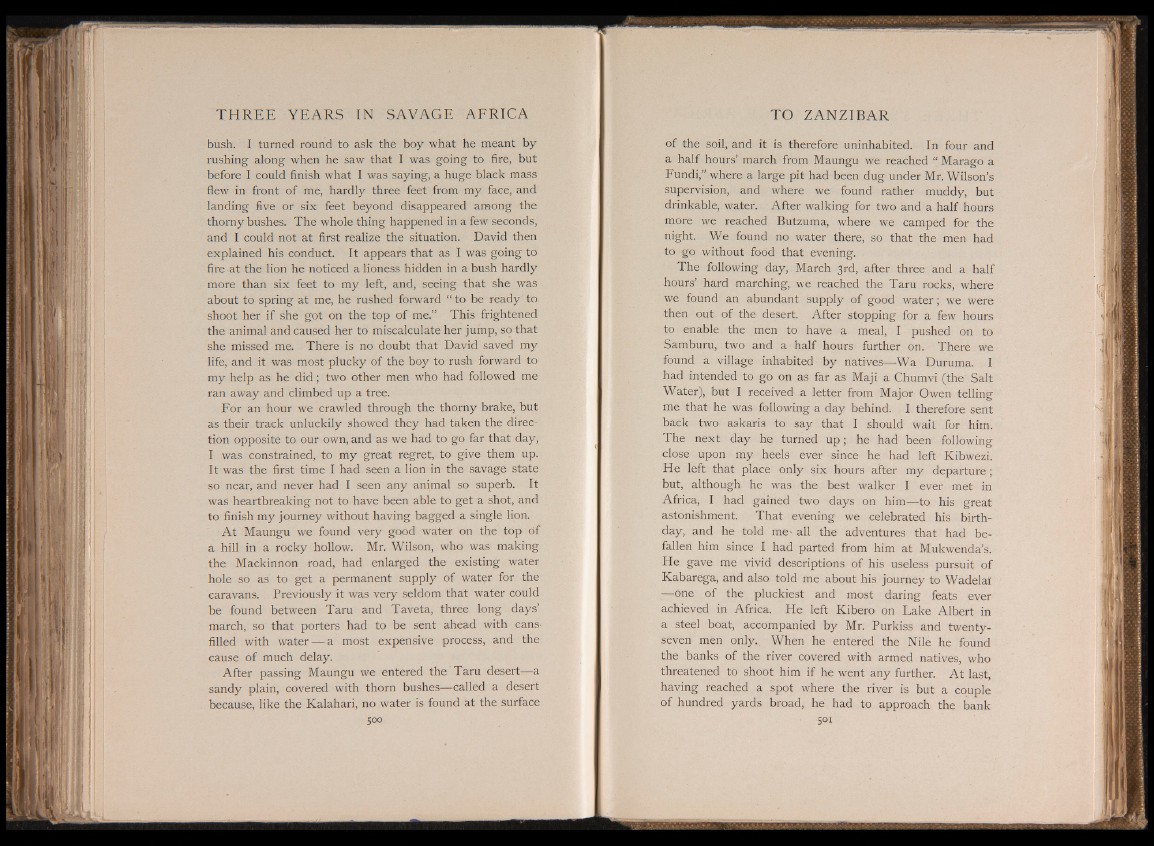
bush. I turned round to ask the boy what he meant by
rushing along when he saw that I was going to fire, but
before I could finish what I was saying, a huge black mass
flew in front of me, hardly three feet from my face, and
landing five or six feet beyond disappeared among the
thorny bushes. The whole thing happened in a few seconds,
and I could not at first realize the situation. David then
explained his conduct. It appears that as I was going to
fire at the lion he noticed a lioness hidden in a bush hardly
more than six feet to my left, and, seeing that she was
about to spring at me, he rushed forward “ to be ready to
shoot her if she got on the top of me.” This frightened
the animal and caused her to miscalculate her jump, so that
she missed me. There is no doubt that David saved my
life, and it was most plucky of the boy to rush forward to
my help as he did; tw7o other men who had followed me
ran away and climbed up a tree.
For an hour we crawled through the thorny brake, but
as their track unluckily showed they had taken the direction
opposite to our own, and as we had to go far that day,
I was constrained, to my great regret, to give them up.
It was the first time I had seen a lion in the savage state
so near, and never had I seen any animal so superb. It
was heartbreaking not to have been able to get a shot, and
to finish my journey without having bagged a single lion.
At Maungu we found very good water on the top of
a hill in a rocky hollow. Mr. Wilson, who was making
the Mackinnon road, had enlarged the existing water
hole so as to get a permanent supply of water for the
caravans. Previously it was very seldom that water could
be found between Taru and Taveta, three long days’
march, so that porters had to be sent ahead with cans-
filled with water — a most expensive process, and the
cause of much delay.
After passing Maungu we entered the Taru desert—-a
sandy plain, covered with thorn bushes—called a desert
because, like the Kalahari, no water is found at the surface
500
of the soil, and it is therefore uninhabited. In four and
a half hours’ march from Maungu we reached “ Marago a
Fundi,” where a large pit had been dug under Mr. Wilson’s
supervision, and where we found rather muddy, but
drinkable, water. After walking for two and a half hours
more we reached Butzuma, where we camped for the
night. We found no water there, so that the men had
to go without food that evening.
The following day, March 3rd, after three and a half
hours’ hard marching, we reached the Taru rocks, where
we found an abundant supply of good water; we were
then out of the desert. After stopping for a few hours
to enable the men to have a meal, I pushed on to
Samburu, two and a half hours further on. There we
found a village inhabited by natives—-Wa Duruma. I
had intended to go on as far as Maji a Chumvi (the Salt
Water), but I received a letter from Major Owen telling
me that he was following a day behind. I therefore sent
back two askaris to say that I should wait for him.
The next day he turned up; he had been following
close upon my heels ever since he had left Kibwezi.
He left that place only six hours after my departure;
but, although he was the best walker I ever met in
Africa, I had gained two days on him—to his great
astonishment. That evening we celebrated his birthday,
and he told me- all the adventures that had befallen
him since I had parted from him at Mukwenda’s.
He gave me vivid descriptions of his useless pursuit of
Kabarega, and also told me about his journey to Wadela'i
—one of the pluckiest and most daring feats ever
achieved in Africa. He left Kibero on Lake Albert in
a steel boat, accompanied by Mr. Purkiss and twenty-
seven men only., When he entered the Nile he found
the banks of the river covered with armed natives, who
threatened to shoot him if he went any further. At last,
having reached a spot where the river is but a couple
of hundred yards broad, he had to approach the bank
501